Blues Beat of the Struggle: Darby Tillis, 1943-2014
By Staff in News on Nov 16, 2014 9:15PM
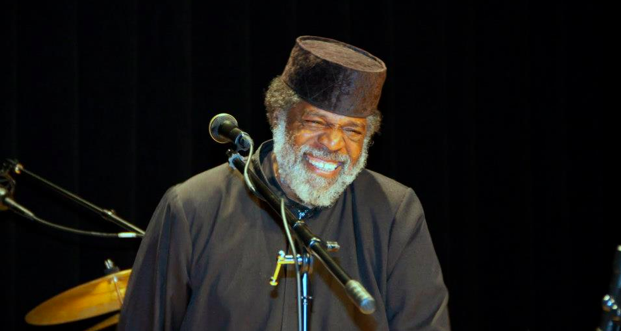
Darby Tillis performing in 2013 with his band, Exoneree © Katie Monroe, Innocence Project
On a sunny winter day in early 1987, Darby Tillis and Perry Cobb walked out of Cook County Criminal Court and into history as Illinois’ first exonerees.
It was a moment five trials, nine years, one month, and 17 days in the making, captured in a grainy photograph. In sharp contrast with the snow-filled background, Darby is decked out in sunglasses, denim, and a dark leather jacket: looking timeless, but with plenty of swagger, halfway between Death Row and the street.
Through the years, his uniform changed and his strut slowed. But this is the same Darby Tillis countless Chicagoans, and activists from across the country, came to love in the three decades between his acquittal and death last week.
After his time in prison, Darby wore many hats, usually all at once. He was a musician and abolitionist; a street preacher with a penchant for street theater; a loving father, husband, mentor, and uncle. But there was one title, “free man,” Darby always rejected. “I left death row but death row never left me,” he would say.
“Crook” County
A bard of a blues man who wrote his own music and lyrics, Darby was a precise wordsmith in this way, and an educator with flair. “Crook County” he would say instead of Cook County. Judge Thomas Maloney, who sentenced Darby and Perry Cobb to death in their fourth trial, would go on to spend 12 years in jail himself, guilty of taking bribes in exchange for fixing murder charges.
In the course of the trial which followed, Cook County State’s Attorney Richard M. Daley—who would become Mayor two years later—attempted to prevent the testimony of a key new witness for the defense. Daley complained directly to the witnesses’ supervisor that his employee’s testimony would “shoot a hole right through our case.”
By that point, the co-defendants had rejected the prosecution’s offer of a plea deal which would have allowed them to walk free for time served—if they plead guilty. “No way,” Cobb said. “Give it to your momma,” said Darby, who wore a tuxedo to their fifth and final trial.
Afterwards, Daley continued building his career on prosecutions, including at least 10 death penalty cases centered on false confessions rendered through police torture. Proof was surfaced by lawyers that the torture was brought to his attention as early as 1982.
Community
The day I attended my first “Live from Death Row” meeting, I knew nothing about the police torture scandal unraveling. It was the day I began to truly know Chicago, falling in with a group of activists who taught me everything that mattered.
Over the next couple of years, I would hear many first-hand accounts—by phone from prison and in person from exonerees—of the torture which took place on the South Side of our city. Their voices, always unwavering and never holding back, filled rooms that also contained family members of those locked up.
A regular speaker was Madison Hobley, who my fellow organizers first met on the other side of prison glass. He had recently been exonerated, foreshadowing what was to come as lawyers flexed their skills in court and we protested and protested, bearing signs with the faces and names of those behind bars who we would later meet outside.
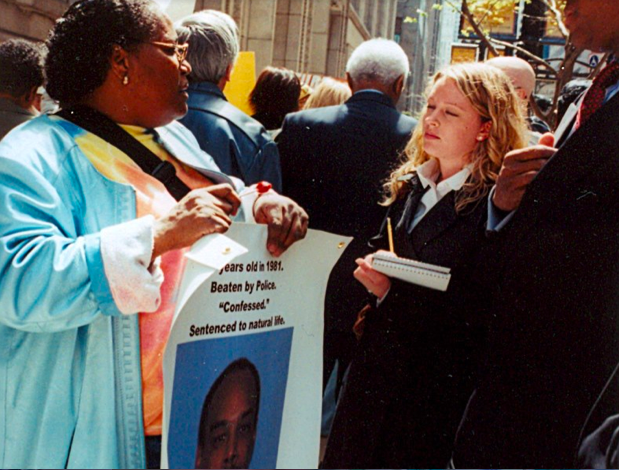
Virginia Clements, holding a poster of her son, Mark Clements, now an organizer with the Campaign to End the Death Penalty.
We got to be a part of such things because of Darby, the beating heart at our group’s center, and because of activists who preceded us—happy to simply be there for prisoners and families, organizing on the notion that solidarity is an empty phrase if it is not a solidarity on a basis defined by those dealt the worst horrors of our society.
It was a beloved community. It was a wild bunch. We once lurked at the top of an escalator at the University of Illinois Chicago with all of our signs about Mayor Daley and torture in front of media at the “Future Cities” conference of mayors from across the country. We protested City Hall or “Crook County” every two weeks as the Special Prosecutor charged with investigating Commander Jon Burge and his police torture ring, appeared for status hearings.
It was also a family affair. Darby’s future wife, Cathy McMillan was part of this crew, a former nun who left the convent and fought on behalf of her wrongfully convicted brother. At this time, their story had yet to unfold, but the group did get to enjoy, in real-time, Darby’s soft side when his teenaged son Beau came to visit. Beau was a loving, good sport, joining us for meetings.
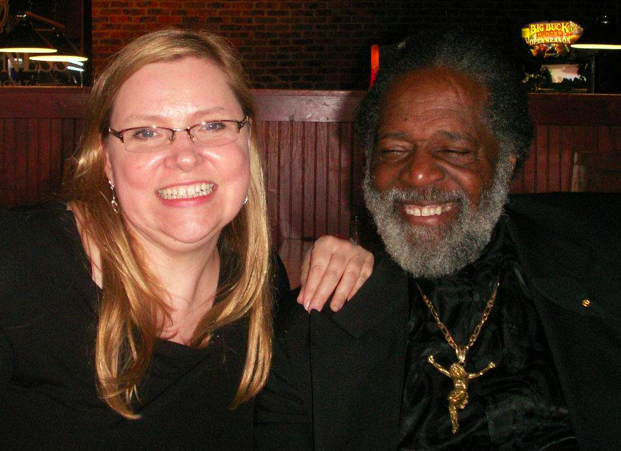
Darby and his wife, Catherine McMillan
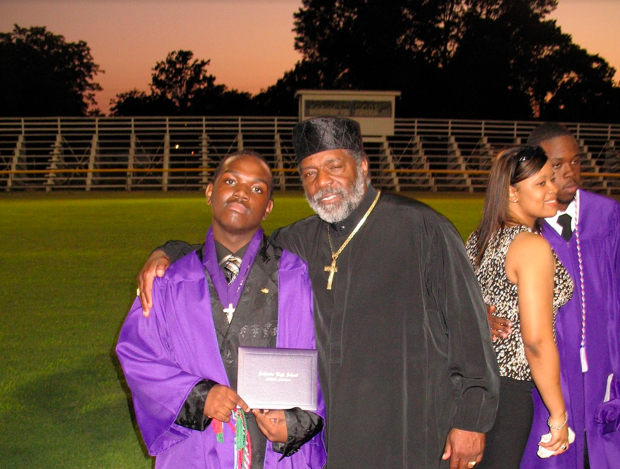
Darby and his son and namesake, Jesse “Beau” Darby Tillis II graduating high school.
We had a chemistry no one could have seen coming: our core was one-third senior citizens with equal representation from “consistent life ethic” Catholics and radicals; and there was a veteran of the civil rights movement, a law student, and a Nation of Islam minister. Among us were always two mothers and a fiance of those tortured, and two sisters of the wrongfully convicted, while other family members came to protests and celebrations.
But these are distinctions only easy to see in retrospect. Because of one of the Catholics, I attended for the first and only time a meeting more than a little tipsy and planning happened nearly as it might among college kids.
I remember one debate that took place over the churning out of posters in my fourth floor Pilsen walk up. I threw out a possible protest date that appalled Gloria Johnson, who fought for her son and “all mothers.” It was Easter weekend, Gloria pointed out.
“Gloria. Easter's about the execution of an innocent man. Ain't no better time to protest the death penalty than Easter weekend,” Darby joked, and we all laughed, sitting on a peel-and-stick linoleum floor, a little high on paint fumes.
Darby was always a hilarious partner in crime. He dubbed me "Sarah the Terror" and it stuck. We laughed at the same things and rolled our eyes at the same time as someone who never did any work would grandstand at a rally. But Darby didn’t just co-organize with you, he truly befriended you and enjoyed talking life. Once, after running into Darby, a girlfriend called me immediately. He had given her the dish, “Sarah changed boyfriends.”
Darby was a firebrand. “They’re body snatchers, flesh merchants, kidnapping young black men and using and abusing them to build their careers,” he would say.
It is easily the most concise and accurate description of the police torture scandal I’ve ever heard. Or if a somber moment hung in the air too long, he would smile broadly and start the chant, “We’re fired up, not gon take it no more.”
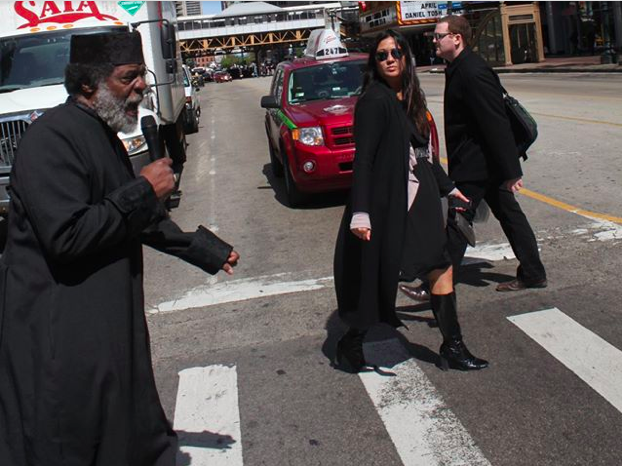
Darby protesting solitary confinement with organizer Alice Kim.
Darby was a national leader who challenged the death penalty overall, and prison itself, as torture. “You are in the Death House…treated like contaminated meat to be disposed of.” he would say, describing cages comprised as much by trauma as metal.
Darby was a confidant to family members. “When I see exonerees, I feel hope,” Martina Correia, sister of Georgia Death Row inmate Troy Davis said once, looking at Darby.
Artistry
But most of all, I think of Darby as an artist, a master of his craft, and I don’t just mean the blues harp.
Activists are artists, creating communities and charting pathways to alternate futures in defiance of the status quo—from nothing but fire in the belly and dreams. They run the gamut of all artists: their work can ooze a clueless privilege and the narrow scope of whiteness.
They may attempt to replicate classic works but mysteriously lack soul. They can sell out and go mainstream. Or, in a matter of moments, their work can forever change our lives. Some have the ability to connect with a multitude of disparate audiences, while some change the world toiling away in obscurity.
There are those who commit to the work for the rest of their lives, never sacrificing an artistic principle and never looking back. They can be mindblowingly talented, persistently firing on all cylinders of guts, and brains, and heart.
A true master of the activist craft was Darby Tillis. He is tragically no longer among us.
But there are master artists of all ages shaking things up in this city, a city which tried to kill Darby and a city that he loved, where Jon Burge has already been in and out of prison, and cops serve as judge, jury, and executioners of young black and brown men on the South and West side streets.
We’ve got work to do, Chicago. I hope you will swagger or wander your way into a meeting and see what happens. To paraphrase James Baldwin, you have to face the origin of the blues to hear the beat if you are not already familiar, but come as you are, and show up again.
“Never give up hope” Darby once said. "You don't ever give up hope."
Darby is survived by a daughter, Ramona Romaine, a son, Jesse “Beau” Tillis II, and his wife, Catherine McMillian. Visitation is set for 4 to 8 p.m. Monday at Noble Funeral Home, 8158 S. Exchange Ave., Chicago. Funeral services will be at 10:30 a.m. Tuesday at the funeral home, preceded by a 30-minute wake.
Sarah “The Terror” Macaraeg is a writer and journalist focused on issues of social justice via essays, data-based investigations, and oral history. Macaraeg is currently editing a book of narratives from low wage women workers in Chicago. She is on twitter @seramak.